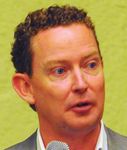Global Business Day Bulletin - A Summary Report of the Cancún Global Business Day
←
→
Page content transcription
If your browser does not render page correctly, please read the page content below
Global Business Day Bulletin
A Summary Report of the Cancún Global Business Day
Published by the International Institute for Sustainable Development (IISD)
in collaboration with WBCSD and ICC
ONLINE AT HTTP://WWW.IISD.CA/CLIMATE/COP16/BD/
VOLUME 160, NO. 3, WEDNESDAY, 8 DECEMBER 2010
SUMMARY OF CANCÚN GLOBAL BUSINESS
DAY:
6 DECEMBER 2010
Cancún Global Business Day met in Cancún, Mexico,
on 6 December 2010, under the theme “Building Bridges.”
This fourth Business Day took place in parallel to the UN
Cancún Climate Change Conference, which convened from
29 November - 10 December 2010. During the opening
session, participants were introduced to the event’s agenda and
theme, which refers to linkages between the private sector and
negotiators under the UN Framework Convention on Climate
Change (UNFCCC) as well as between actors in developed and
L-R: Cesar Remis, Ministry of Foreign Affairs, Mexico; Moderator Yvo
developing countries. de Boer, KPMG; Jean-Yves Caneill, Electricité de France (EDF)
Christiana Figueres, Executive Secretary, UNFCCC, offered
a keynote speech that reviewed the state of negotiations at that they favored the successful completion of a new global
the Moon Palace Hotel, the venue for the official talks. She climate change policy framework, valid beyond 2012, which
challenged businesses to exert leverage in three areas: by promotes urgent and sustained mitigation and adaptation plans.
looking at their value chains; by leveraging change within the “Business Day at COP 14” convened in Poznań, Poland,
sectors in which each business operates; and by leveraging their on 9 December 2008. This event featured panel sessions on: a
political constituencies. shared long-term vision, mitigation, adaptation, technology, and
The approximately 180 participants at Business Day, financing and investing. Participants sought to contribute to the
in the Westin Hotel, engaged in discussions regarding: the UNFCCC negotiation process by interrelating the themes of the
experience of the Mexican Dialogues, a series of events that Bali Action Plan with the four main areas of business capability
brought representatives from the private sector and government and initiative: energy efficiency and demand-side management,
together in the lead-up to the Cancún negotiations; patterns technology development and deployment, carbon markets and
for diffusion of technology; the forms and strengths of South- financing, and sectoral approaches.
South trade and its contributions to a green economy; and the The third such event, “Copenhagen Business Day,” convened
global realities affecting responses to climate change and clean at the headquarters of the Confederation of Danish Industry,
energy growth. The proceedings at Cancún Global Business in Copenhagen, Denmark, on 11 December 2009. The event
Day will inform the evaluation by the World Business Council featured more than 40 speakers and panelists and included: a
for Sustainable Development (WBCSD) and the International plenary during which UNFCCC Executive Secretary Yvo de
Chamber of Commerce (ICC) of the Mexican Dialogue Boer challenged participants to consider their role in addressing
experience, with a view to deciding how to participate in the
preparations for the 2011 Durban Climate Change Conference
in South Africa. IN THIS ISSUE
Cancún Global Business Day was organized by the WBCSD
and the ICC, and was sponsored by CEMEX. This report
summarizes the presentations and discussions during Cancún A Brief History of Business Day . . . . . . . . . . . . . . . . . . . .1
Global Business Day.
Report of Cancún Global Business Day . . . . . . . . . . . . . .2
A BRIEF HISTORY OF BUSINESS DAY Working Together . . . . . . . . . . . . . . . . . . . . . . . . . . . .3
The first Business Day, called the “Bali Global Business Investing in Clean Technologies . . . . . . . . . . . . . . . .3
Day,” was organized in parallel with the thirteenth session of New Markets and Opportunities . . . . . . . . . . . . . . . .4
the Conference of the Parties (COP 13) of the UNFCCC in Unlocking the Solutions . . . . . . . . . . . . . . . . . . . . . .5
Nusa Dua, Bali, Indonesia, on 10 December 2007. The Bali
Wrap Up . . . . . . . . . . . . . . . . . . . . . . . . . . . . . . . . . . .5
Global Business Day included panels on energy efficiency,
zero-carbon technologies, large-scale carbon control, and clarity
in climate policy. Business participants at that event made clear
The Global Business Day Bulletin is a publication of the International Institute for Sustainable Development (IISD) , publishers of the Earth Negotiations
Bulletin © . This issue was written and edited by Faye Leone and Lynn Wagner, Ph.D. The Digital Editor is Diego Noguera. The Editor is Soledad
Aguilar . The Director of IISD Reporting Services is Langston James “Kimo” Goree VI . Funding for coverage of this meeting has
been provided by WBCSD and ICC. IISD can be contacted at 161 Portage Avenue East, 6th Floor, Winnipeg, Manitoba R3B 0Y4, Canada; tel: +1-204-958-7700; fax:
+1-204-958-7710. The opinions expressed in the Bulletin are those of the authors and do not necessarily reflect the views of IISD. Excerpts from the Bulletin may be
used in other publications with appropriate academic citation. Electronic versions of the Bulletin are sent to e-mail distribution lists (in HTML and PDF formats) and can
be found on the Linkages WWW-server at . For information on the Bulletin, including requests to provide reporting services, contact the Director
of IISD Reporting Services at , +1-646-536-7556 or 300 East 56th St., 11A, New York, New York 10022, United States of America.2 Global Business Day Bulletin, Volume 160, No. 3, Wednesday, 8 December 2010
climate change; sessions on fulfilling potential by 2012, setting she said there is agreement that finance is necessary, but there
the course for 2020, and envisioning the future in 2050; and is a debate on whether to
panel discussions among CEOs titled “Taking the gloves off.” establish the fund here
In July 2010, the Government of Mexico launched a followed by negotiations on
process of informal public-private dialogues on climate its design, or to design the
change, through WBCSD and ICC, recognizing that neither fund before establishing it.
governments nor business can solve the problem of climate Figueres noted that
change alone and that private sector participation increases ministers have begun
the likelihood of the development and implementation of arriving in Cancún, and
effective and sustainable policies to address climate change. said the ministers attended
On 15-16 July 2010, the “Mexican Dialogues” began a a dinner on the beach
Mexico City dialogue titled “Preparing ourselves for green on Saturday evening, 4
growth.” It was followed by a dialogue on “Financing green December, at the invitation
growth” in Geneva, Switzerland, on 1-2 September; a dialogue of the Conference of the
on “Markets and green growth” in Bonn, Germany, on 16 Parties (COP) President, Jean-Guy Carrier, Secretary
October; and a dialogue on “Technology for green growth” in who invited participants to General, International Chamber of
Commerce (ICC)
New Delhi, India, on 11 November. walk to a nearby nesting
area of sea turtles. She recounted that one minister commented
REPORT OF CANCÚN GLOBAL BUSINESS DAY that negotiations are like turtles: long-living and slow-moving.
Figueres then asked what the role of the business sector
Matthew Bateson, World Business Council for Sustainable is, and suggested that businesses could exert leverage in
Development (WBCSD), welcomed participants to Cancún three areas: by looking at their value chains; by leveraging
Global Business Day. He said the event’s theme, “Building change within the sectors that each business operates; and
Bridges,” referred not just to linkages between the private by leveraging their political constituencies. She highlighted
sector and negotiators, but also between actors in developed the Mexican Government’s work to facilitate a public-private
and developing countries. dialogue and expressed hope that South Africa would pick
Christiana Figueres, Executive Secretary, UN Framework up this dialogue. She said that more must be done, however,
Convention on Climate Change (UNFCCC), then delivered because the private sector is currently acting as a brake
the keynote address. She reviewed the status of negotiations on negotiations. She said the private sector should push
in the UN Cancún Climate Change Conference, highlighting governments in the right
the issues being discussed direction, acting as rabbits
in the two negotiating in the tale of the tortoise
tracks. She said negotiations and the hare, but with both
under the Kyoto Protocol racers finishing in this
are at a standstill, with version of the story.
industrialized countries split Bjorn Stigson, President,
over whether to develop a WBCSD, said it is
second commitment period challenging for the private
for emission reductions sector to engage in the
under this agreement, UNFCCC process, given
and developing countries that it is not a negotiating
expecting that industrialized partner. Governments go
countries will take into working groups and
Christiana Figueres, UN Framework Björn Stigson, President, World
commitments under the Convention on Climate Change close the door, he said, Business Council for Sustainable
Kyoto Protocol. She said (UNFCCC) Executive Secretary and there is a need to find Development (WBCSD)
the talks in Cancun are not likely to resolve whether there will the right mechanism for
be a second commitment period, but without an agreement on businesses to give input. Stigson pointed to the participation
the Kyoto Protocol that is acceptable to both developed and of Yvo de Boer, former UNFCCC Executive Secretary, in the
developing countries, progress is not likely to be made on the Day’s proceedings, and requested his advice on how to carry
other track. business messages to the political process.
Figueres said the other track, on Long-term Cooperative Jean-Guy Carrier, Secretary General, ICC, praised
Action (LCA), includes a number of sub-tracks of negotiations, participants for seizing opportunities and moving faster than
including the discussion with regard to peaking, for which governments to respond to climate change, as opposed to those
debate is focused on whether to indicate a specific year in businesses that plan to “jump off that bridge when we get to
which peak temperatures will be reached, whether to reference it.” He said that business has been asked to play a special role,
a specific temperature increase, and what those figures would including providing funding, but has had little opportunity to
be. On adaptation, she said negotiators are focusing on whether make its views clear to the UNFCCC process. He noted that
the scope should cover the negative effects of climate change the ICC has begun carrying its messages to other arenas, such
or also incorporate response measures. On mitigation, there is as the Group of 20 (G20) Summits.
a discussion of how to capture countries’ individual emission Lorenzo Zambrano, Chairman and Chief Executive
reduction proposals, which, although the largest existing body Officer, CEMEX, welcomed participants and said business’
of pledges, are not anchored in a multilateral agreement and competitiveness requires a robust climate change framework.
are not sufficient to achieve a two degree target. On finance, He recognized the efforts of Mexican President Felipe3 Global Business Day Bulletin, Volume 160, No. 3, Wednesday, 8 December 2010
Henry Derwent, President and CEO, International Emissions
Trading Association (IETA), discussed the Mexican Dialogue
on Markets for Green Growth. He said that, although the
negotiations affect business, little communication between
private sector and government representatives is taking place in
Cancún. He said that only the negotiators’ “pink badge” affords
the needed access.
Jean-Yves Caneill, Electricité de France (EDF), discussed
the Mexican Dialogue on Technology for Green Growth. He
said “transfer” refers to creating the conditions for private
sector investment in
developing countries,
not to giving them
technology. He said
Lorenzo Zambrano, Chairman and Chief Executive Officer, CEMEX investment requires
long-term, predictable,
Calderón and the Mexican Government to engage the private clear policies to create
sector, and highlighted areas in which the private sector can confidence, and noted
contribute to the climate change solution, including: addressing the possible contribution
the issue of accelerating urban development; developing new of the UNFCCC’s
models of public-private cooperation; and accelerating work Expert Group on
in sustainable building products. He suggested being specific Technology Transfer
about what business needs from government. to facilitate the role of
business investments in
WORKING TOGETHER developing countries.
This panel focused on making business’ role in climate He said there had
change solutions more effective, and determining the potential been agreement that Cesar Remis, Ministry of Foreign Affairs,
Mexico
of the Mexican intellectual property
Dialogues. The rights (IPR) were essential for the private sector, and that
discussion was capacity building is crucial to enable developing countries to
moderated by implement technologies.
Yvo de Boer, In response to a question about what WBCSD and ICC will
Special Global do to build on the Mexican Dialogues, Bjorn Stigson said the
Advisor, KPMG. Dialogue experience will be evaluated next week, with a view
He suggested that to deciding how to proceed. On the negotiations regarding a
speakers should technology mechanism, he said one already exists – business –
consider the type and he expressed concern that efforts to negotiate a reinvention
of platform that of business could create a “bureaucratic monster.”
would let business
interact more with INVESTING IN CLEAN TECHNOLOGIES
Yvo de Boer, KPMG
negotiators. He This panel discussion considered whether traditional
clarified that, in his patterns of technology transfer are changing, and what lessons
statement to Copenhagen Business Day, in December 2009, he can be learned. Preeti Malhotra, Alstom, said her company
did not say business has not been engaged in the negotiations, considers technology transfer a natural part of doing business
as some reports suggested. Rather, he said his message was and that it provides opportunities for innovation. She identified
that business had failed to convey its message in a relevant barriers to technology transfer, including: lack of absorptive
format – one that negotiators could insert into an agreement. capacity in developing countries; absence of free markets;
Cesar Remis, Director General for Bilateral Economic and lack of IPR protection.
Affairs, Government of Mexico, said Copenhagen had been a She suggested: linking regional
turning point in governments’ recognition that they could not governments and businesses for
succeed alone in implementing climate change solutions. He research; exchanging regional
said Mexico had launched a more inclusive dialogue process, best practices; and addressing
which South Africa would continue next year. investment risks, including by
Three speakers then introduced each Dialogue. Russel sharing the risk with public
Mills, The Dow Chemical Company, discussed the Dialogue actors.
on Finance for Green Growth, and said the Mexican Dialogue Roland Verstappen, Arcelor
was the right thing to do. He stated that new energy sources Mittal, said his global steel
take about 30 years to achieve a 1% global market share, company has established a
and said subsidies and financial incentives are necessary to company-wide target to reduce
stimulate that kind of change. De Boer said negotiators are CO2 emissions by 8%, with 60% Jean-Yves Caneill, EDF
likely to establish a new fund here in Cancún, possibly to be to be achieved through improved
administered by the World Bank. energy efficiency. He said governments need to: establish
clear and consistent standards; accept that they need long-term
energy policies; provide new finance mechanisms; and support4 Global Business Day Bulletin, Volume 160, No. 3, Wednesday, 8 December 2010
education, energy services and research and development.
He discussed a new filter technology that could help reduce
emissions from steel production significantly, but said the cost
is prohibitive.
Engelina Jaspers, Hewlett Packard, reviewed her company’s
unique system of labs, through which innovations are
developed and then transferred to Hewlett Packard business
groups. Guillermo Jiménez, Acciona, said Acciona invests
in Mexico because of its renewable resources and regulatory
framework. He said Acciona offers technology transfer by
training local people and offering job security, investing in
social projects to help underdeveloped areas to incorporate the
new technology to improve their lives, and working with local
educational authorities to improve capacity.
Vesile Kulacoglu, World Trade Organization (WTO), Moderator Henry Derwent, President and CEO, IETA
said open markets, along with predictable, stable national
potential for regional growth of South-South trade, and also
regulatory frameworks, provide the enabling environment for
noted that innovation in areas that are developing quickly
technology transfer. She said: tariffs are as high as 10% in
through the uptake of new technologies is leading to more
some developing countries; non-tariff measures are increasing,
South-North trade.
including on energy efficiency and emissions controls; barriers
Prashant Modi, President and CEO, Great Eastern Energy
include local content requirements that can be as high as 70%;
Corporation, said certain industries can be geographically
and on environmental services, many countries have committed
aligned, but the real question lies in implementation. Vania
to opening the environmental services sector, which combined
Somavilla, Vale, noted that developing countries have
with goods comprised US$780 billion in 2010. She said that
land, forests and sun, all of which represent opportunities.
climate-friendly technologies are about half of that package.
She indicated a preference for institutional and regulatory
In response to a question during the discussion, she said the
incentives to financial incentives, and noted the promise of
climate problem needs to be solved within the UNFCCC, not
South-South partnerships, based on relative similarities of
the WTO, context.
the cultures involved. Mohsen Khalil, International Finance
Moderator Nick Campbell, ICC, noted that multiple
Corporation, said it should be called “climate business”
speakers had emphasized public-private partnerships, as well
instead of “climate change.” He emphasized the importance
as working with local people to build enabling environments.
of scalability and indicated his anticipation that South-North
Michael Grubb, Chair, Climate Strategies, said carbon
transfer will be a major feature in the future.
technology innovation can be thought of in relation to: long-
term investments that have little short-term returns; carbon UNLOCKING THE SOLUTIONS
pricing; and consumer engagement. He said innovation centers Mark Spelman, Accenture, moderated this high-level panel,
could be positive with the right governance structure. He also which discussed the global realities affecting responses to
suggested thinking about which coalitions could be created to climate change and clean energy growth. Nobuo Tanaka,
achieve action, and said it will take 10-20 years to get a global Executive Director, International Energy Agency (IEA),
framework that works. emphasized the role of energy efficiency in achieving a 450
ppm scenario, and that the Copenhagen Accord pledges could
NEW MARKETS AND OPPORTUNITIES
achieve 70% of this target. He said, inter alia: technological
Henry Derwent, IETA, moderated this panel. He
innovations need to come
expressed concern about the UNFCCC’s concept of common
quickly; fossil fuel consumption
but differentiated responsibilities, which he said may be
subsidies should be phased out;
appropriate from an historical perspective, but not as a basis
and UNFCCC negotiators have
for developing the technology to deliver a clean economy.
a top-down approach, setting
Ricardo Melendez-Ortiz, CEO, International Centre for
international targets, but we also
Trade and Sustainable Development (ICTSD), reported that an
need the bottom-up approach
ICTSD case study on patents had found that many developing
of countries acting on their
countries have
Copenhagen pledges.
capabilities to
Jennifer Morgan, World
produce and trade
Resources Institute, said the US
components of
is not likely to pass domestic
windmills. He
climate change legislation soon, Prashant Modi, President and
cited research
but the US Administration CEO, Great Eastern Energy
demonstrating Cooperation
could achieve approximately
that international
14% emission reduction
frameworks matter
through Environmental Protection Agency (EPA) actions and
in technology
regulations. She suggested that business should send US policy
innovation. Wendy
makers messages supporting smart approaches by the EPA.
Poulton, Eskom
Gregory Barker, Minister of State, UK Department of
Holdings Limited,
Preeti Malhotra, Alstom Energy and Climate Change, said his country is in a strong
said there is a
position to become the first major economy to fundamentally5 Global Business Day Bulletin, Volume 160, No. 3, Wednesday, 8 December 2010
decarbonize its economy. He there is not sufficient interaction between the private sector
said that ambitious targets and negotiators. Morgan asked what it would take to get
are being put in place, to demonstration projects moving within the Clean Energy
be followed by measures to Ministerial approach.
achieve them, such as carbon Tanaka suggested framing mitigation as “energy security.”
capture and storage (CCS), On their top priorities for the next 12 months, some panellists
energy efficiency and support emphasized CCS. Tanaka said that whether CCS is accorded
for feed-in tariffs. Clean Development Mechanism (CDM) status would be a
Graeme Sweeney, Royal litmus test of negotiators’ seriousness.
Dutch Shell, suggested that
business could do much while WRAP UP
awaiting an international Laurent Corbier, ICC, summarized the themes of Cancún
agreement, if the “vital few” Global Business Day to have focused on: pace and speed of
Gregory Barker, Minister of
State, Department of Energy who can take action are negotiations and innovation; gaps, including between what
and Climate Change, United
supported by political leaders. has been pledged and what is expected; and partnerships and
Kingdom
He said that Europe’s emissions collaboration. He reflected on different cultural connotations
platform on CCS, for example, brings public money from the of the moon, given that the official negotiations are taking
emissions trading scheme together with private money. place at the Moon Palace Hotel, with the moon representing: a
Brian Dames, CEO, Eskom Holdings Limited, agreed that different planet, something unattainable, and myth/opportunity
business could take action before an international agreement turned into reality.
is finalized. He noted that affordable and accessible electricity Stigson noted that the private sector is expected to
would help Africa develop, and that technology transfer for contribute in a substantial way to the promised US$100 billion
adaptation is crucial for the region, given its dry climate. annual flows to developing countries, but said it is unclear
Carmen Becerril, CEO Acciona Energía, said climate how this will happen given that developing countries expect
change solutions much of this to be grant
are being set money. He said he expects
in opposition the “green race” to be a
to economic competition about who
growth, and will dominate the global
noted that it economy. He suggested
is difficult for that business should use
industry to the next year to engage
plan without an more with their domestic
international counterparts in government,
agreement. develop bolder messages
Yvo de Boer and be more precise about
highlighted what they want from
the need to governments.
make the green Cancún Global Business
growth case at Day closed at 5:40 pm, Graeme Sweeney, Royal Dutch Shell
Moderator Mark Spelman, Accenture following which participants
the country and
company level, and said targets are not likely to change for were invited to a reception and networking partnership fair
the next six years. He said the focus should be on Nationally hosted by Yvo de Boer, KPMG.
Appropriate Mitigation Actions (NAMAs).
During the discussion, Barker highlighted the need
to build an understanding of how the private sector can
harness the power of green growth, and reiterated that
Participants during the reception.You can also read



























































